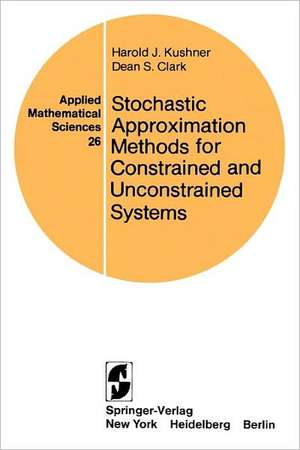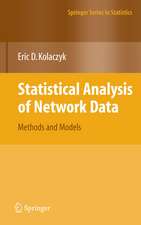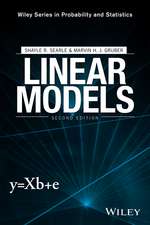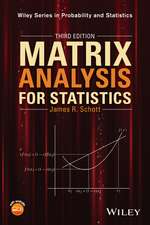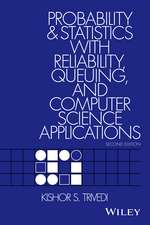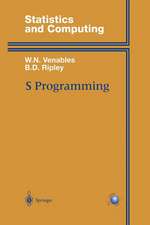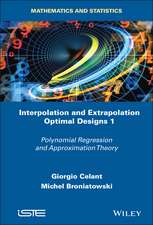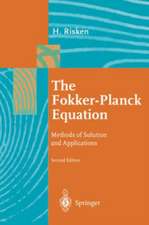Stochastic Approximation Methods for Constrained and Unconstrained Systems: Applied Mathematical Sciences, cartea 26
Autor H.J. Kushner, D.S. Clarken Limba Engleză Paperback – 3 aug 1978
Din seria Applied Mathematical Sciences
- 13%
 Preț: 426.94 lei
Preț: 426.94 lei - 13%
 Preț: 426.46 lei
Preț: 426.46 lei - 13%
 Preț: 427.63 lei
Preț: 427.63 lei - 9%
 Preț: 1728.59 lei
Preț: 1728.59 lei - 24%
 Preț: 906.80 lei
Preț: 906.80 lei - 23%
 Preț: 659.07 lei
Preț: 659.07 lei -
 Preț: 375.65 lei
Preț: 375.65 lei - 18%
 Preț: 909.47 lei
Preț: 909.47 lei - 18%
 Preț: 795.02 lei
Preț: 795.02 lei - 18%
 Preț: 950.52 lei
Preț: 950.52 lei - 15%
 Preț: 645.47 lei
Preț: 645.47 lei - 20%
 Preț: 755.49 lei
Preț: 755.49 lei -
 Preț: 382.67 lei
Preț: 382.67 lei - 24%
 Preț: 808.06 lei
Preț: 808.06 lei -
 Preț: 452.62 lei
Preț: 452.62 lei -
 Preț: 190.23 lei
Preț: 190.23 lei -
 Preț: 399.12 lei
Preț: 399.12 lei - 18%
 Preț: 966.90 lei
Preț: 966.90 lei - 15%
 Preț: 643.48 lei
Preț: 643.48 lei - 15%
 Preț: 528.80 lei
Preț: 528.80 lei -
 Preț: 413.15 lei
Preț: 413.15 lei -
 Preț: 390.25 lei
Preț: 390.25 lei - 18%
 Preț: 736.01 lei
Preț: 736.01 lei - 18%
 Preț: 1411.05 lei
Preț: 1411.05 lei - 15%
 Preț: 711.21 lei
Preț: 711.21 lei -
 Preț: 395.47 lei
Preț: 395.47 lei - 18%
 Preț: 1017.26 lei
Preț: 1017.26 lei -
 Preț: 403.15 lei
Preț: 403.15 lei - 18%
 Preț: 1130.14 lei
Preț: 1130.14 lei - 18%
 Preț: 1134.87 lei
Preț: 1134.87 lei - 18%
 Preț: 1329.00 lei
Preț: 1329.00 lei - 18%
 Preț: 1129.65 lei
Preț: 1129.65 lei - 18%
 Preț: 1140.71 lei
Preț: 1140.71 lei
Preț: 386.99 lei
Nou
Puncte Express: 580
Preț estimativ în valută:
74.05€ • 79.19$ • 61.74£
74.05€ • 79.19$ • 61.74£
Carte tipărită la comandă
Livrare economică 17 aprilie-01 mai
Preluare comenzi: 021 569.72.76
Specificații
ISBN-13: 9780387903415
ISBN-10: 0387903410
Pagini: 263
Ilustrații: X, 263 p.
Dimensiuni: 155 x 235 x 15 mm
Greutate: 0.39 kg
Ediția:Softcover reprint of the original 1st ed. 1978
Editura: Springer
Colecția Springer
Seria Applied Mathematical Sciences
Locul publicării:New York, NY, United States
ISBN-10: 0387903410
Pagini: 263
Ilustrații: X, 263 p.
Dimensiuni: 155 x 235 x 15 mm
Greutate: 0.39 kg
Ediția:Softcover reprint of the original 1st ed. 1978
Editura: Springer
Colecția Springer
Seria Applied Mathematical Sciences
Locul publicării:New York, NY, United States
Public țintă
ResearchCuprins
I. Introduction.- 1.1. General Remarks.- 1.2. The Robbins-Monro Process.- 1.3. A “Continuous” Process Version of Section 2.- 1.4. Regulation of a Dynamical System; a simple example.- 1.5. Function Minimization: The Kiefer-Wolfowitz Procedure.- 1.6. Constrained Problems.- 1.7. An Economics Example.- II. Convergence w.p.1 for Unconstrained Systems.- 2.1. Preliminaries and Motivation.- 2.2. The Robbins-Monro and Kiefer-Wolfowitz Algorithms: Conditions and Discussion.- 2.3. Convergence Proofs for RM and KW-like Procedures.- 2.4. A General Robbins-Monro Process: “Exogenous Noise”.- 2.5. A General RM Process; State Dependent Noise.- 2.5.1. Extensions and Localizations of Theorem 2.5.2.- 2.6. Some Applications.- 2.7. Mensov-Rademacher Estimates.- III. Weak Convergence of Probability Measures.- IV. Weak Convergence for Unconstrained Systems.- 4.1. Conditions and General Discussion.- 4.2. The Robbins-Monro and Kiefer-Wolfowitz Procedures.- 4.3. A General Robbins-Monro Process: Exogenous Noise.- 4.4. A General RM Process: State Dependent Noise.- 4.5. The Identification Problem.- 4.6. A Counter-Example to Tightness.- 4.7. Boundedness of {Xn} and Tightness of {Xn(•)}.- V. Convergence w.p.1 For Constrained Systems.- 5.1. A Penalty-Multiplier Algorithm for Equality Constraints.- 5.2. A Lagrangian Method for Inequality Constraints.- 5.3. A Projection Algorithm.- 5.4. A Penalty-Multiplier Method for Inequality Constraints.- VI. Weak Convergence: Constrained Systems.- 6.1. A Multiplier Type Algorithm for Equality Constraints.- 6.2. The Lagrangian Method.- 6.3. A Projection Algorithm.- 6.4. A Penalty-Multiplier Algorithm for Inequality Constraints.- VII. Rates of Convergence.- 7.1. The Problem Formulation.- 7.2. Conditions and Discussions.- 7.3. Rates of Convergence for Case 1,the KW Algorithm.- 7.4. Discussion of Rates of Convergence for Two KW Algorithms.
